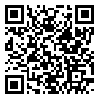مجله رویش روانشناسی از دادن گواهیهای کاغذی معذور است. لطفا تقاضا نکنید. همه گواهی ها در صفحه شخصی کاربران موجود است.
year 13, Issue 3 (spring 2024 2024)
Rooyesh 2024, 13(3): 1-10 |
Back to browse issues page
Ethics code: IR.UT.PSYEDU.REC.1402.023
Download citation:
BibTeX | RIS | EndNote | Medlars | ProCite | Reference Manager | RefWorks
Send citation to:



BibTeX | RIS | EndNote | Medlars | ProCite | Reference Manager | RefWorks
Send citation to:
Mojaver S, Arjmandnia A A, SHokoohi Yekta M, GHobari Bonab B, Jafarkhani F. (2024). The Feasibility of executive function training program using augmented reality on social skills children with high-functioning autism spectrum disorder. Rooyesh. 13(3), 1-10.
URL: http://frooyesh.ir/article-1-5234-en.html
URL: http://frooyesh.ir/article-1-5234-en.html
Shirin Mojaver1 
 , Ali akbar Arjmandnia *2
, Ali akbar Arjmandnia *2 
 , Mohsen SHokoohi Yekta3
, Mohsen SHokoohi Yekta3 
 , Bagher GHobari Bonab3
, Bagher GHobari Bonab3 
 , Fatemeh Jafarkhani4
, Fatemeh Jafarkhani4 


 , Ali akbar Arjmandnia *2
, Ali akbar Arjmandnia *2 
 , Mohsen SHokoohi Yekta3
, Mohsen SHokoohi Yekta3 
 , Bagher GHobari Bonab3
, Bagher GHobari Bonab3 
 , Fatemeh Jafarkhani4
, Fatemeh Jafarkhani4 

1- PhD student in Psychology and Exceptional Children Education, Faculty of Psychology and Educational Sciences, University of Tehran, Tehran, Iran.
2- Professor, Department of Psychology and Education of Exceptional Children, Faculty of Psychology and Education, University of Tehran, Tehran, Iran. ,arjmandnia@ut.ac.ir
3- Professor, Department of Psychology and Education of Exceptional Children, Faculty of Psychology and Education, University of Tehran, Tehran, Iran.
4- Assistant Professor, Department of Educational Technology, Faculty of Psychology and Educational Sciences, Allameh Tabataba’i University, Tehran, Iran.
2- Professor, Department of Psychology and Education of Exceptional Children, Faculty of Psychology and Education, University of Tehran, Tehran, Iran. ,
3- Professor, Department of Psychology and Education of Exceptional Children, Faculty of Psychology and Education, University of Tehran, Tehran, Iran.
4- Assistant Professor, Department of Educational Technology, Faculty of Psychology and Educational Sciences, Allameh Tabataba’i University, Tehran, Iran.
Abstract: (854 Views)
This study aimed to investigate the Feasibility of the executive functions training program using augmented reality on social skills in high-functioning children with autism spectrum disorder. The research was conducted using a semi-experimental method with a pre-test-post-test design and a control group with a three-month follow-up period. The statistical population of the study included all children with autism spectrum disorder with high functioning in Tehran in 2023- 2024. After screening the research sample according to the entry and exit criteria, eligible children were included in the study and randomly assigned to two experimental (15 people) and control (15 people) groups. The research tool included Gilliam's autism diagnostic scale - Second Edition (1994). The variance analysis method with repeated measurements was used to analyze the data. The findings showed that the executive functions training program using augmented reality had a significant effect on the control group in the two stages of post-test and follow-up (p<0.001). Also, the effect size showed a 0.29% effect of the executive functions training program using augmented reality on social skills. It is concluded that to improve social skills in children with autism spectrum disorder, augmented reality can be used to teach executive functions.
Keywords: Executive functions, high functioning children with autism spectrum disorder, social skills, augmented reality.
Type of Article: Research |
Subject:
Clinical Psychology
Received: 2024/03/16 | Accepted: 2024/04/18 | ePublished: 2024/06/23
Received: 2024/03/16 | Accepted: 2024/04/18 | ePublished: 2024/06/23
Send email to the article author
| Rights and permissions | |
 |
This work is licensed under a Creative Commons Attribution-NonCommercial 4.0 International License. |



